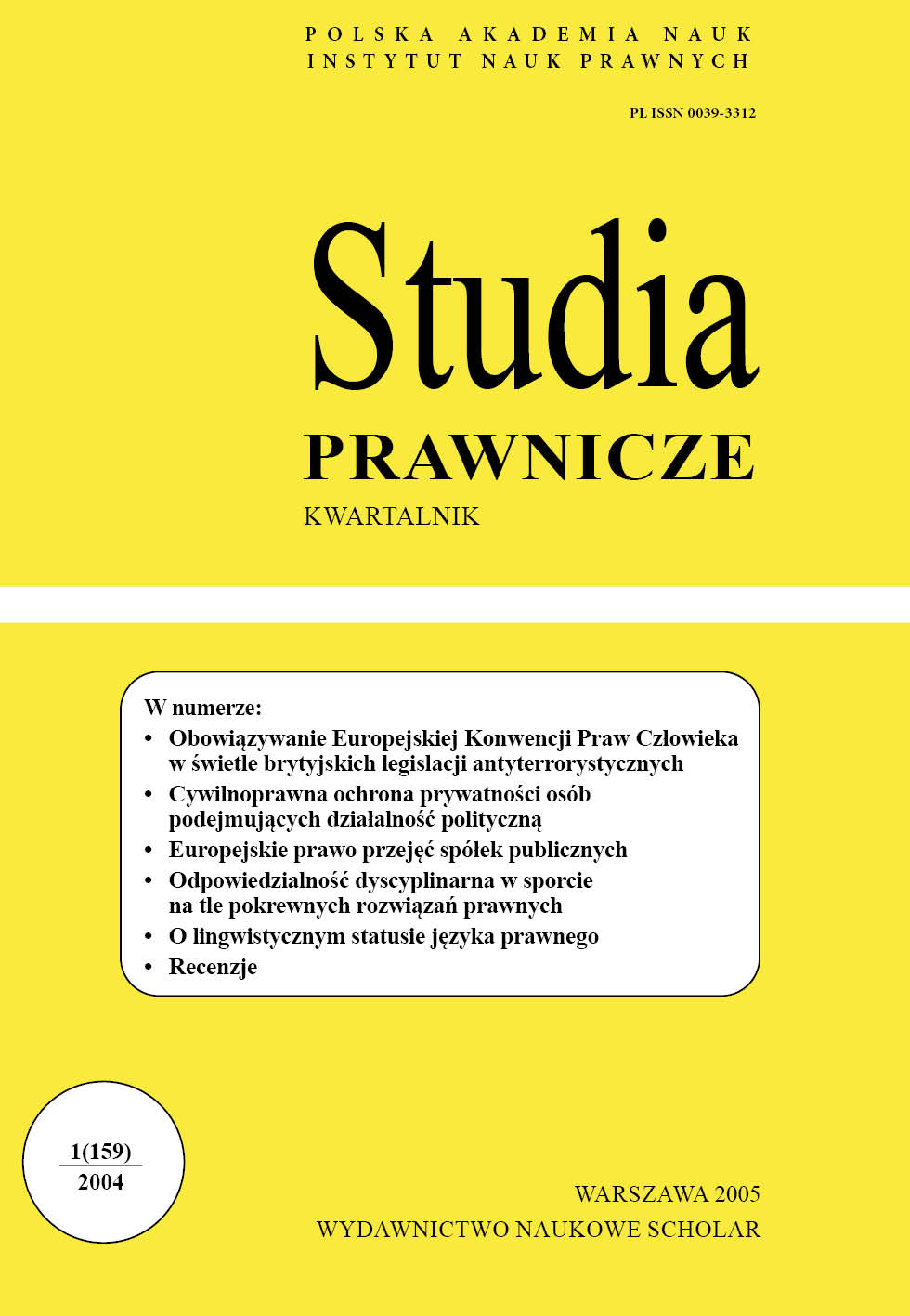Obowiązywanie Europejskiej Konwencji Praw Człowieka w świetle brytyjskich legislacji antyterrorystycznych
The applicability of the European Convention on Human Rights in light of British anti-terrorism legislation
Author(s): Jacek BarcikSubject(s): Law, Constitution, Jurisprudence
Published by: Instytut Nauk Prawnych PAN
Keywords: anti-terrorist activities; United Kingdom; derogation; state security; legislation
Summary/Abstract: On December 14, 2001, just three months after the traumatic events of 9/11, British law was expanded by the addition of new anti-terrorism legislation. Of the many controversies raised by the Anti-Terrorism, Crime and Security Act 2001 (ATCSA), the most objections concern its core part, i.e. Part 4. Immigration and Asylum, which grants the competent minister the right to detain people who are not citizens of the United Kingdom without trial, on the basis of a certificate. Consequently, Part 4 contradicts Article 5 of the ECHR, which guarantees the right to liberty and personal security. In order to implement it, the United Kingdom had to derogate Article 5(1) of the ECHR, which was formally done on December 18, 2001. Since, through the transformative provisions of the 1998 Human Rights Act (HRA), the ECHR also became a part of the UK’s domestic legal system, an amendment to the HRA was also necessary. Without such an amendment, a number of provisions of the HRA (Articles 2, 3, 4, 6, 7, 8, 9, and 19) would prevent the application of the provisions of the ATCSA. In making the derogation, the United Kingdom took advantage of the possibility provided by the derogation clause set forth in Article 15 of the ECHR. An analysis of the conditions of derogation under that article raises many doubts as to its legality. These doubts concern the existence in the UK of a state of a public hazard that threatens the life of the nation, the preservation of the proportionality of the measures taken, and their inconsistency with other international obligations. Bodies of the Council of Europe have accepted the derogation “with mixed feelings”; however, they did (the Committee of Ministers) or did not (the High Commissioner for Human Rights) grant to the state fighting terrorism the right to abrogate its ECHR obligations. A form of “mitigation” of Part 4 of the ATCSA is provided by the “safeguard clauses” of its Articles 28 and 29. On their basis, the controversial Articles 21-23 will expire definitively on November 10, 2006 and temporarily 15 months after the law took effect. Therefore, it was necessary to issue (on March 12, 2003 and March 12, 2004) regulations extending the application of Articles 21-23 for the following years. After nearly 2.5 years of their application, an assessment can be made of how Part 4 of the ATCSA is working in practice. The right to detain is exercised in a fair, proper, and moderate manner. However, the author asks whether it was necessary to take such radical measures, which constitute, as some would phrase it, “the dismantling of the cornerstones of civil society.” He suggests that perhaps a better solution would be to subject persons suspected of terrorist activities to constant surveillance, in accordance with standard surveillance procedures, or to charge them with one of the crimes listed in the Terrorism Act of 2000. The provisions of the ATCSA are an example of a vicious circle, where restrictions on the rights and freedoms of members of national or religious minorities imposed to fight terrorism become the impetus for actions against the discriminatory law. Hence, “the sine qua non condition for achieving the anticipated results of the fight against terrorism is to maintain the necessary balance between the restriction of rights and freedoms and the actual threat.” Also, “the power of the executive to put a person in prison, without formulating the charges against him or her, for a crime provided by law, and especially denying him or her the right to a trial, is most repulsive and is the foundation of any totalitarian government, without distinction whether Nazi or Communist.”
Journal: Studia Prawnicze
- Issue Year: 159/2004
- Issue No: 1
- Page Range: 5-24
- Page Count: 20
- Language: Polish

